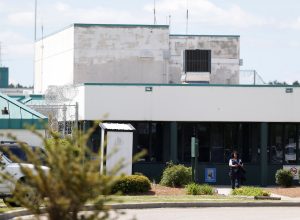
(Reuters) – A gang-related dispute sparked an overnight riot in a South Carolina prison that killed seven inmates, the deadliest U.S. prison riot since 1993, state officials and prison safety experts said on Monday.
Another 17 people were wounded in an eight-hour long series of fights that spread through three dorms at the Lee Correctional Institution in Bishopville, South Carolina, said Bryan Stirling, director of the state Department of Corrections.
“This was all about territory. This was about contraband, this was about cellphones,” Stirling told a news conference. “These folks are fighting over real money and real territory while they are incarcerated.”
It was the deadliest U.S. prison riot since 1993, when nine inmates and one corrections officer died at the Southern Ohio Correctional Facility in Lucasville, said Steve Martin, a prisons expert and now the federal monitor for the consent decree involving New York City’s Rikers Island jail complex.
All seven deaths were the result of stabbing injuries, said Lee County Coroner Larry Logan.
Forty-four guards were on duty at the 1,583-inmate prison when violence erupted Sunday evening, Stirling said. Prison staff called in reinforcements and did not move into the first unit until four hours after the fighting began, a delay that he said was necessary to ensure the guards’ safety.
For months, South Carolina officials have said that prisoners used smuggled cellphones to manage crimes outside the prisons. Governor Henry McMaster on Monday said he would renew his request to federal officials to allow him to block cell signals on prison property.
The State newspaper showed video it said was taken by inmates with smuggled phones that depicted trails of blood and dead bodies in the prison. Reuters could not immediately confirm that the video was authentic and Stirling declined to do so.
The state has about 5,000 prison employees in 22 institutions, but “security staff numbers continue to lag behind the authorized strength,” the department’s fiscal 2017 Accountability Report said, without giving numbers.
Martin said staff shortages could have been a contributing factor in the riot.

A guard leaves the main entrance of the Lee Correctional Institution in Bishopville, Lee County, South Carolina, U.S., April 16, 2018. REUTERS/Randall Hill
“When high-security inmates start engaging each other and there aren’t enough staff, it’s hard to stop it,” Martin said in a phone interview.
State officials identified the slain inmates as Raymond Scott, 28, who was serving a 20-year sentence for crimes including assault and battery; Michael Milledge, 44, serving 25 years for drug trafficking; Damonte Rivera, 24, serving life for murder; Eddie Gaskins, 32, serving 10 years for domestic violence; Joshua Jenkins, 33, serving 15 years for manslaughter; Corey Scott, 38, serving 22 years for kidnapping; and Cornelius McClary, 33, serving 25 years for burglary.
(Reporting by Ian Simpson in Washington and Rich McKay in Atlanta; Writing by Scott Malone; Editing by Chizu Nomiyama, Jeffrey Benkoe, Susan Thomas, Jonathan Oatis and Steve Orlofsky)


